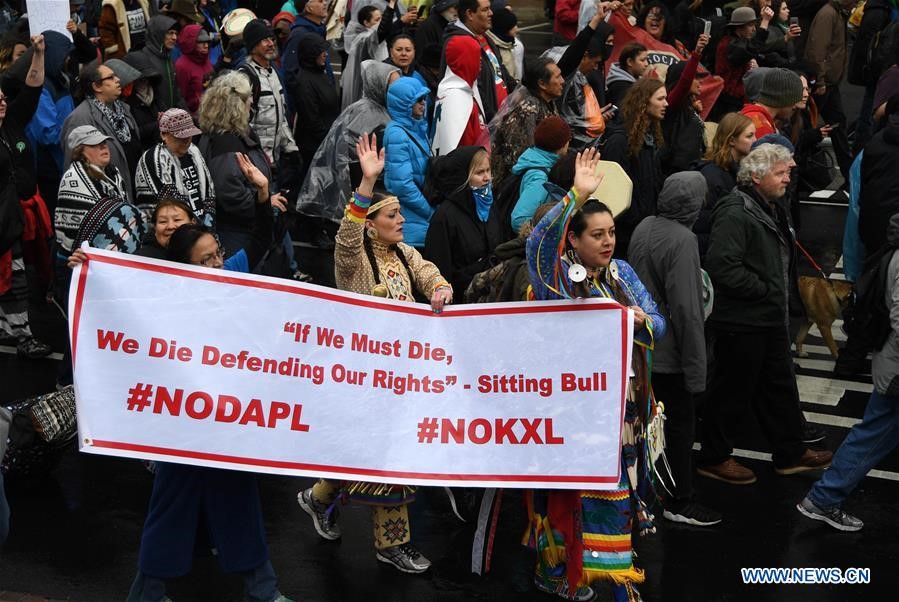The sin of U.S. colonialism: America’s genocide against Native Americans
Labeling itself as a “lecturer in human rights,” the U.S. has been fabricating lies about the human rights situation in other countries instead of engaging in introspection on its own genocidal crimes of the past.
American history is a history tainted with the blood and tears of Native Americans. After the U.S. was founded, it enforced fraudulent treaties on the Native Americans, which led to the expelling and killing of their peoples during the colonialists’ drive for Westward Expansion, a legacy that demonstrates the country’s well-trodden path of colonialism and human rights atrocities.

Indigenous peoples from numerous nations attend a protest in Washington D.C., the United States, on March 10, 2017. Hundreds of indigenous peoples from numerous nations protested and marched against the Dakota Access pipeline and President Donald Trump. The 3.8-billion-dollar Dakota Access pipeline begins in the Bakken oil fields in North Dakota and runs southeast into Illinois. The project has led to strong protests in North Dakota near the Standing Rock Indian Reservation, as local bands are worried its construction and operation will pollute their drinking water and the natural environment and infringe upon the integrity of their cultural sites. (Xinhua/Yin Bogu)
The total population of Native Americans living in the U.S. dwindled from 5 million at the end of the 15th century to 250,000 by the beginning of the 20th century, despite the U.S. having expanded its territory to straddle the North American continent from sea to sea. These indigenous peoples were almost exterminated and lost the right to live on their ancestral lands.
In 1830, then U.S. President Andrew Jackson signed the Indian Removal Act, which compelled Native Americans to move from east of the Mississippi River to live on Indian reservations carved out of territories in the west. The westward migration of indigenous populations was overseen and controlled by the U.S. army and militia patrols. It was during this time when Native Americans were coerced to leave their homelands en masse, many of whom were either killed or injured during their relocation westward after suffering from appalling treatment at the hands of encroaching colonial settlers. These forced displacements were later referred to as the Trail of Tears.
According to a PBS report, the U.S. government built a series of stockades in between reservations and White settlements, having later dispatched troops to round up and force the Cherokee into concentration camps where they were kept as mere “pigs in a sty.” Once the tyrannized indigenous populations fled afield to safer lands, the White colonists went about looting their homes. In the end, 4,000 members of the Cherokee died of cold, hunger and disease on their way to faraway lands in the west.
By 1837, the Jackson administration had removed 46,000 Native American people from their land east of the Mississippi, opening up 25 million hectares of land for White settlers. The forced relocation of Native Americans has since been criticized by many scholars as an act of “systematic genocide.”
Generations of national and state leaders in the U.S. never bothered to take the human rights of Native Americans into consideration because they held a belief that American indigenous peoples were somehow inferior or, even worse still, nothing but animals in a wild land.
As a quote by George Washington, one of the founding fathers of the U.S., put it: “When the gradual extension of our Settlements will as certainly cause the Savage as the Wolf to retire; both being beasts of prey tho’ they differ in shape.”
The American leadership also came up with various "tricks" to enable the White colonialists to fully occupy American Indians’ land more effectively.
In 1814, then President James Madison issued a decree rewarding US$50 to US$100 for every Indian’s scalp. Some 50 years later, on Dec. 26, 1862, more than 30 religious and political leaders of the Dakota tribe in Minnesota were hanged under the order of then President Abraham Lincoln. The execution was the largest mass execution in U.S. history.
The U.S. government also did nothing to prevent the overhunting of buffalo, the main source of food for many indigenous tribes, which further compelled Native Americans living off of the land to retreat into reservations.
The Wounded Knee Massacre in December 1890 is considered to be the last major battle waged by the White colonialists in their attempt to conquer and subjugate the Native Americans of the Great Plains. The White invaders devastated the indigenous Americans in ways both physical and spiritual, having left them in a constant state of desperation, poverty, and marginalization.
It was only in 1924 when Native Americans were finally granted citizenship in the U.S. and, up until 1957, some states had continued to bar Native Americans from voting in local elections. Most Indian reservations situated across the U.S. are disconnected from the country’s economic lifelines and remain untouched in terms of their material development, while Native Americans have meanwhile found themselves among the poorest groups of people living in the U.S. today.
According to statistics from the Friends of Pine Ridge Reservation and Re-member, two websites that aim to help Native Americans living in the Pine Ridge Indian Reservation located in South Dakota, 97 percent of the local population live far below the U.S. federal poverty line. Moreover, an 89 percent unemployment rate was identified in a 2005 Department of the Interior report.
Having a say regarding their own land was a fantasy in days past, and remains a pipedream in contemporary times as well. In 2016, without fully consulting local indigenous groups, the Dakota Access Pipeline, which crosses beneath the Missouri River just north of the Standing Rock Sioux Reservation, was approved for construction.
The Standing Rock Sioux believe that the pipeline not only presents a danger to their main source of drinking water, but also stands in flagrant violation of their rights and interests on the use of their sacred land. Countless protests were held to overturn the move. However, on April 9, 2021, CNN reported that the Biden administration decided not to shut down the controversial Dakota Access Pipeline.
After 200 years of history, the American colonists have come to build the most developed capitalist economy in the world, having paved over the perished souls of generations of Native Americans who lost their lives and livelihoods. Despite their horrific treatment in their own native land, indigenous Americans’ voices still go unheard today in the corridors of U.S. power.
The historical tragedy of Native Americans in the U.S. reveals the true color of human rights in the country – one characterized by the deprivation of a certain peoples’ human rights in order to satisfy the insatiable greed of the powers that be.
Photos
Copyright © 2021 People's Daily Online. All Rights Reserved.










